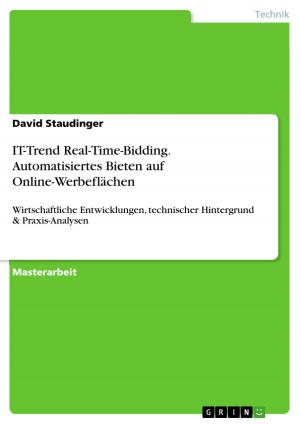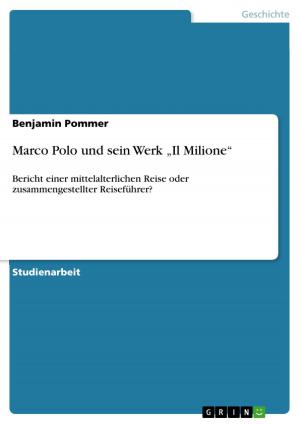EC Competition Law - The Essential Facilities Doctrine
To what extent is the Essential Facilities Doctrine established in Community law and how has its application under Article 82 EC evolved over time?
Nonfiction, Reference & Language, Law, Business| Author: | Veronica Hagenfeldt | ISBN: | 9783640880683 |
| Publisher: | GRIN Verlag | Publication: | March 30, 2011 |
| Imprint: | GRIN Verlag | Language: | English |
| Author: | Veronica Hagenfeldt |
| ISBN: | 9783640880683 |
| Publisher: | GRIN Verlag |
| Publication: | March 30, 2011 |
| Imprint: | GRIN Verlag |
| Language: | English |
Scientific Essay from the year 2009 in the subject Law - Civil / Private / Trade / Anti Trust Law / Business Law, University of Edinburgh (School of Law), course: EC Competition Law, language: English, abstract: The first aim of this paper is to establish the Essential Facilities Doctrine's (EFD) undeniable existence in EC law and to determine how its application has evolved over time by analysing the relevant case law. By outlining the legal theory of the EFD, Part I shows that the Doctrine is a well-established competition law remedy within the refusal to supply framework of Article 82 EC. This paper argues that the EFD should be an exceptional measure, only applied after careful balancing of the dominant undertaking's freedom of contract and right to property against the potential benefits to consumer welfare. By investigating how the EFD has been applied practically in refusal to supply case law, the second half of Part I identifies the different criteria under which refusal to grant access to an essential facility was deemed to constitute an abuse, and concludes that the circumstances in which the EFD was initially applied were not consistent. It is submitted that it was not until the Bronner Judgment that the EU institutions began applying the EFD to refusal to supply cases within a coherent and sufficiently strict legal framework. Part II will deal with the second aim of this essay, namely to evaluate the legal evolution of the Doctrine's controversial application to Intellectual Property Rights (IPRs). Because compulsory licensing of IPRs can have grave negative repercussions on innovation and consumer welfare, this paper maintains that the EFD's application to IPRs should be exceptional and subject to the strictest of conditions. It accordingly supports the notion that IPRs require special deference in comparison to physical property rights, and notes that the EFD is applied to IPRs under stricter legal standards than when applied to other property rights. The second half of Part II investigates the Doctrine's application to refusal to licence cases. This paper identifies that there has recently been a significant and regrettable attenuation of the abovementioned stricter standards since the criteria of the exceptional circumstances test under which the EFD results in compulsory licensing have been indefensibly widened following the landmark Microsoft Judgment.
Scientific Essay from the year 2009 in the subject Law - Civil / Private / Trade / Anti Trust Law / Business Law, University of Edinburgh (School of Law), course: EC Competition Law, language: English, abstract: The first aim of this paper is to establish the Essential Facilities Doctrine's (EFD) undeniable existence in EC law and to determine how its application has evolved over time by analysing the relevant case law. By outlining the legal theory of the EFD, Part I shows that the Doctrine is a well-established competition law remedy within the refusal to supply framework of Article 82 EC. This paper argues that the EFD should be an exceptional measure, only applied after careful balancing of the dominant undertaking's freedom of contract and right to property against the potential benefits to consumer welfare. By investigating how the EFD has been applied practically in refusal to supply case law, the second half of Part I identifies the different criteria under which refusal to grant access to an essential facility was deemed to constitute an abuse, and concludes that the circumstances in which the EFD was initially applied were not consistent. It is submitted that it was not until the Bronner Judgment that the EU institutions began applying the EFD to refusal to supply cases within a coherent and sufficiently strict legal framework. Part II will deal with the second aim of this essay, namely to evaluate the legal evolution of the Doctrine's controversial application to Intellectual Property Rights (IPRs). Because compulsory licensing of IPRs can have grave negative repercussions on innovation and consumer welfare, this paper maintains that the EFD's application to IPRs should be exceptional and subject to the strictest of conditions. It accordingly supports the notion that IPRs require special deference in comparison to physical property rights, and notes that the EFD is applied to IPRs under stricter legal standards than when applied to other property rights. The second half of Part II investigates the Doctrine's application to refusal to licence cases. This paper identifies that there has recently been a significant and regrettable attenuation of the abovementioned stricter standards since the criteria of the exceptional circumstances test under which the EFD results in compulsory licensing have been indefensibly widened following the landmark Microsoft Judgment.















